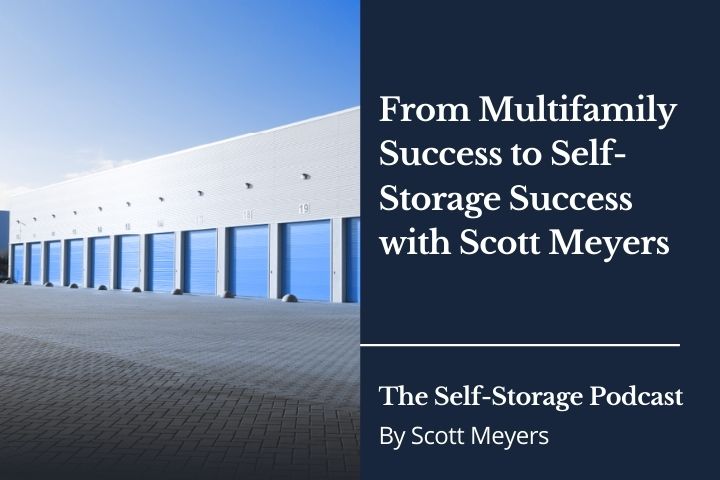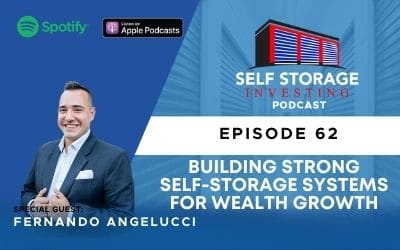Ginny Sutton is the executive director for the Texas Self-Storage Association. In this episode she discusses the evolution of the self-storage industry, highlighting the shift from a less professional approach to a more sophisticated business model.
Sutton emphasizes the importance of joining industry associations for networking, education, and advocacy purposes. She also shares advice on the importance of insurance, property taxes, and seeking advice from experienced industry professionals.
And the future? Sutton says further consolidation in the industry and the increased use of technology, including artificial intelligence is going to shake things up.
WHAT TO LISTEN FOR
1:21 Growth and the Evolution of the Self-Storage Industry in Texas
6:45 The Role of Lobbying and Advocacy on the Business Environment
27:02 The Impacts of Technology Advancements on Self-Storage
31:48 Trends and Future Predictions in Self-Storage
Leave a positive rating for this podcast with one click
ABOUT GINNY SUTTON
Ginny Sutton has been the executive director for the Texas Self Storage Association, the largest state self-storage association in the country, since 1997. Her career in association management spans 30 years, with previous work as the director of education for the Austin Apartment Association. During her tenure at TSSA, the membership has expanded from approximately 800 to 3,000 members who own more than 5,000 facilities in Texas and a few surrounding states. For the past 26 years, Ginny has supported and advised self-storage owners, managers, and developers, as well as the vendors who serve the self-storage industry. Ginny has a bachelor’s degree from the University of Texas with a teaching certification in English and Journalism. She and her husband live in Central Texas and have two grown sons.
CONNECT WITH GINNY
LinkedIn
CONNECT WITH US
Website | You Tube | Facebook | X | LinkedIn | Instagram
Follow so you never miss a NEW episode! Leave us an honest rating and review on Apple or Spotify.
Episode Transcript
Ginny Sutton (00:00):
I don’t think of it as a dangerous thing for self storage. I think if we’re using remote management, AI can probably help more than hurt in most cases.
Announcer (00:18):
This is the Self Storage Podcast where we share the knowledge and skills from the industry’s leading investors, developers, and operators to help you launch and grow your Self storage business. Your host, Scott Meyers, over the past 18 years has acquired, developed, converted and syndicated nearly 5 million square feet of Self storage nationwide with the help of his incredible team at Selfstorageinvesting.com, who has helped thousands of people achieve greatness in Self storage.
Scott Meyers (00:53):
Hello everyone, and welcome back to the Self Storage Podcast. I am your host, Scott Meyers, and on today’s episode, we have a very special guest. I’m a veteran in the industry, Ms. Ginny Sutton. Ginny, welcome to the podcast.
Ginny Sutton (01:06):
Thank you, Scott, I appreciate it.
Scott Meyers (01:10):
Well, Ginny, your name needs no introduction in the cell storage circles, but if you would, for those who may not have heard of you or have seen you speak somewhere, tell us a little bit about your background and really how you got into self storage.
Ginny Sutton (01:21):
Alright, that’s always an interesting question. How did I get into self storage? Because in a way, I’m not in self storage. I am involved in an organization that works with people in self storage. I am the executive director for the Texas Self-Storage Association. I was hired in 1997, and so that means I’ve been there 26 years. And so I have interacted with and dealt with many people in the self-storage business, specifically in Texas. But because of our activity across the nation, have interacted with folks from every state. I don’t know if that’s, how did I get into the business? That was what you asked me specifically. I had been a teacher, high school teacher and then decided to take a break from that and ended up working for another real estate organization, another association for several years, for six years. And my former boss recommended me for this position. I’d never been an executive director, but I came on when the association had about 800 members and we’ve got about 5,000 facility members in the state of Texas now. So been quite a journey.
Scott Meyers (02:41):
Well, and one of the largest and if not the most vibrant organization by far, and if you folks Storage Nation, if you have not been to the Texas show, if you blinked and then opened your eyes again, it is every bit as well run as the national shows. And it really mimics and feels like that as well in terms of the content and the type of show that they put on. But also, Ginny, if you would, let’s do a little bit of background. I think many people, especially if they’re new to the industry, they may or may not know what an association is, but what does the Self Storage Association do for its members? And then specifically if you join your state association, which we’re constantly telling everybody in our mastermind and everybody that comes through our academies that you have to for these reasons, but for those that are not familiar with the reasons why they should, I like to hear your pitch as to why somebody should join their association.
Ginny Sutton (03:35):
That’s a great question. Of course I’m prejudiced because I’ve been doing this a long time and I worked for another association before that. But trade associations exist specifically to make the industry they serve better, to help them, to advocate for them, to educate them, to provide resources of all kinds. We really think of ourselves as soup to nuts as far as being a resource. I can’t tell you how many different kinds of questions I’ve had over my time with the association. And it can range from everything with problems you’re having with a manager, personnel issues to tax issues, to, I mean, anything you can imagine that’s related to self storage as an industry, issues with your doors, issues with all kinds of things. And so although we can’t be everything to everyone, we try really hard. That’s the goal of a good association is to provide whatever the particular person in the industry need.
(04:39):
And I would say, Scott, just, and this is not a pitch, this is not a plant, you didn’t ask me to say this, but where we probably are not as strong is helping people jump into the industry, helping them develop. That’s where we really suggest they deal with a professional like yourself, with a consultant, with someone who will help them understand all the different decisions they have to make. We do have resources, but they are more geared to people who are in the industry. Once they’re in the industry up and running, we’re there for you. We provide a lot of legal resources too.
Scott Meyers (05:20):
Well, I appreciate that, and that is I guess the gap when I get into the business that there wasn’t an education company that from A to Z soup to nuts with teach people how to get in. And that’s once I became an investor and I was running a real estate investment group here in Indianapolis, we thought, well, I think it’s probably time that we start teaching people about how to get into it. But after I visited my first show, I recognized there’s a lot of education that goes on at the shows. And what the association does is then gathered data and best practices and then understands how collectively we can all do it better. But for me, and maybe this is selfishly or self-serving, I think the biggest benefit of being a part of the association is truly all the things that I don’t see and that I’m not a part of, which are the lobbying efforts on behalf of our industry and on behalf of us as the folks that are in the business.
(06:10):
And you didn’t ask me to do this either, but anybody who’s heard me talk about associations will recognize that we tell everybody, there’s no question if you buy a facility in Arkansas, you join the Arkansas Storage Association, you buy a facility in Texas, Michigan, anywhere else, you need to join their association because they, not only will you benefit from that, from the resources, but tenfold from the lobbying efforts in which the associations are doing on behalf of the industry. So could you focus a little bit on that through the years, what you’ve done in Texas or what the associations at large do and the benefits that they bring to the members?
Ginny Sutton (06:45):
Yes. So that was a great pitch because lobbying advocacy is really one of those things that’s severely underappreciated. And I’ll even say that I myself underappreciated it and didn’t understand the magnitude of it, what it means to people in the business. I’d worked for another association and I’d seen the lobbying and the local advocacy that had taken place, but we were at a local association, so it was in the city of Austin, so everything was Austin oriented. When you work with a state organization, it’s statewide, and we work with our state legislatures. Now, I want to pitch SSA the national organization because without them, one of the things that people find when they’re in some of the state is that the associations are small. They’re still fledgling. They really haven’t gotten to critical mass yet. And that’s a really difficult challenge because the people in the industry have to step up and become part of that organization.
(07:49):
And when you’re new to a business, when you’re developing your first facility or looking at it, you don’t think of yourself as an expert and you don’t think you have anything to contribute to a state organization, but that’s not necessarily true. You can actually just contribute your questions, all of the things that you are looking for as resources and help create those. So that’s kind of double-edged, not a sword, but kind of a pitch where I’m talking about both. It can be tough for people in smaller associations to say, we just don’t have the manpower. We just don’t have the size to really work on anything. And that’s where the SSA, the Self-Storage Association, the national organization comes in Texas is very independent. We do all our own advocacy. We work with SSA through a partnership, but most of these states don’t have people on the ground or the money to work on state issues.
(08:48):
So SSA really helps fill the gap there, and they will lobby at the state level if there are not the resources in place and the things that are covered through advocacy, again, run the gamut and I’ll just give you a couple of examples. I look at advocacy and lobbying as falling into two buckets. There’s reactive and they’re proactive. And the proactive, of course, is trying to get out in front of the things that are maybe currently okay, but not great. Some of the states still require you to send certified mail for lien foreclosures, for example, who does certified mail anymore. But some of these state statutes are still cut up old. I mean, they were created 20 years ago or 30 years ago, in our case, 35 years. And so they lag behind and they need to be brought up to speed. So trying to recognize those things.
(09:42):
SSA is great about having a set of seven main things that they advocate for in any state or will help those states try to aim for. And in our case, we still require newspaper print, newspaper advertising for lien sales in our statute. And it’s an embarrassment. I mean, really, I look at that and I think I’ve been here 26 years, I’ve worked on it. You try so hard, but the newspaper industry in Texas is still very powerful. They have a lot of sway over the legislature and it is an uphill battle, and we put a lot of energy and effort into that in the session that just wrapped up and we still weren’t successful. We got it through the house, but in every legislature, there’s a house and a Senate and you got to get it through both. And so we got it through the house. We could not get it through the Senate. That’s just an example of one of many things. I’ve been around long enough to see weird laws proposed. Like years ago, there was a bill proposed that would’ve made it illegal for you to sell a Bible as part of a foreclosure, part of a seizure. You’re like, okay, first of all, we don’t know if there’s a Bible in a Unit.
(10:56):
There could be, I mean, is it in a box? Is it with a bunch of other books? You don’t know. That’s just an example of many. There was one that would’ve made it illegal to sell toys with a certain substance in them. Again,
Scott Meyers (11:12):
How would you know?
Ginny Sutton (11:14):
You know? Yeah. So
(11:16):
They run the gamut. Property tax laws are very important, super important for people, especially investors, getting into the business. What am I going to be dealing with there? Are there any caps in how much my taxes can go up from year to year? So I could talk, I’m sorry, Scott, I could talk for at least an hour just on this one topic, but what makes it difficult sometimes is people have no idea what’s going on behind the scene and what is being advocated for. And it does make a big difference in how you run your business and how profitable you can be.
Scott Meyers (11:51):
Well, of course it does. And anybody out there, if you own one to a handful of properties, if there’s something that is difficult for you to conduct a business in your state, then what are your options? You can sit and complain about it and we can all wonder and ask questions like, why is this silly law on the books? And that’s what I found myself doing. And I started in 2005 here in the state of Indiana, and there wasn’t a state association. So in 2006, I brought Mike Scanlon to the state of Indiana to launch the Indiana. So storage association, well, it didn’t take right away. It took I think three years before it actually formed, before we had that critical mass of people. But then you’re right, I don’t know. It’s not the most attractive thing to put money towards, if you will, as a cell storage owner. But the benefit is incredible, especially when you again, pool those dollars together for all of these things from having standardized forms and agreements that we can use within our state that rolls up and matches what the rest of the nation is doing. But then more importantly, again, as we talk about, in my opinion, is the lobbying efforts so that there’s just less friction in doing business because we get some of these barriers removed.
Ginny Sutton (13:05):
It’s a difficult, what’s in it for me proposition. Sometimes you don’t see the direct impact and you’re willing to just kind of ride the coattails of what’s being done for you. But when you’re in a state where the resources are less, sometimes you have to be the one. Sometimes you have to be at least part of the starting group. You’re not going to be committed for the rest of your life, but sometimes you just have to jump in there and serve for a while. Then you can step back and let somebody else take over. So when you say it didn’t take, I found myself thinking, oh no, what happened? I can kind of guess what happened. It is hard to find the people at the state level who will jump in there and get involved. It’s a lot of work. I don’t want to do that. So it can be tricky, but thank you for your plug on associations. It’s true. A lot of people who are smaller are just getting in. The dues can range from a hundred dollars to several hundred dollars. I think New York or one of the associations is $400 a year or something like that. It sounds like a lot in one way, And Then it sounds so cheap in another. It’s like, what do you pay for your insurance? This is part of that. It’s kind of insurance.
Scott Meyers (14:17):
Yeah. I hear so many people say, boy, that’s an awful lot of money to put that little sticker on my door. It’s like, There’s a little more than that that goes Into it.
Ginny Sutton (14:24):
There’s a little more to, and it’s a collective effort. You all have to kind of throw your money, like you said, put your money in the bucket together so that you can make these things happen.
Scott Meyers (14:35):
Well, Ginny, you’re in the swan song phase of your career as executive and director at Texas. As you look back on all the things that you’ve achieved and really what you’ve seen in the beginning of self storage or from the time that you began in the self storage industry, what would you say that you could point back to and say that you’re most proud of, that either you at the state level or your association or even collectively at the national level was able to achieve or accomplish on behalf of its members?
Ginny Sutton (15:06):
Wow, that’s a great question. There are so many things. To be honest with you, and I’m not pointing at myself because I was fortunate enough, when I was hired in 1997, we had a very committed board and they were very well established already. I said we had 800 members. A lot of the associations that have existed for 15, 20 years don’t have nearly that number of them. So we had a good jumpstart when I came on board. We had a very dedicated board. They were focused a lot. I would say their primary focus when I was hired was on legal issues, on statutory stuff, on advising people. When I started, there was a lot of bad behavior out there in the industry. I’ll just put it that way. There was bad behavior, there were bad actors. Everyone from small operators to the REITs, the very large operators would do bad things and that it would get a lot of attention.
(16:02):
And as a result, either somebody was being sued, lawsuits were far more common when I got into the business when I started, because people would make a lot of mistakes and they just felt bulletproof. They felt like they could do whatever they wanted, and I would constantly be reading about lawsuits that were being filed. So I would say one of the things I’m proudest of is that we’ve tried to set the bar high as far as establishing appropriate behaviors for self-storage owners and educating them and putting standards out there in front of them and standardizing things. Like you said, the forms, the leases. Texas Association has more than 90 forms that we promulgate per members. So whatever it is that you can experience, we probably had it before and we created something to get ahead of it. So we do a lot of advising people.
(16:56):
We do that in a lot of different ways. So if I had to pick one thing, Scott, I would say I feel like collectively in Texas and the other state associations and the national associations have helped the industry be better. And I mean, you just rarely hear about lawsuits now, and it was a common thing. And the wreaths themselves, there used to be be class action suits quite frequently, and you’d think, well, so what a class action suit from a real large operator, a public company, how does that impact me? It can impact late fees and insurance sales and I mean, you name it, foreclosing on military personnel, you name it. All these things can have dire consequences. And I’ve seen the lawsuits, I’ve seen people lose their whole businesses over it. So luckily, I think because that bar has been raised and because we do, I think a very good job of educating our members and kind of putting it out across the state, it’s rare that there’s a bad actor now.
(18:02):
And when there is, you can kind of distance yourself and say, that’s not the typical, that’s not what we do. And that helps us lobby because we can point out that that is not representative. Yeah, that’s not representative of the typical self-storage owner. So I could go on, there’s some other things that I think we’re particularly proud of, but that’s probably number one is just helping raise the bar and educate our members and everyone else out there that we can to help run our businesses better, just keep things above board. When I started, there were, I wouldn’t say people looked at many warehouses, which is what they were called back then, many warehouses as slum lords, but there was not a good feeling towards the industry. And I think one of the critical things that I have seen change over the years, and I give SSA credit for this too, is representing the industry in a positive way and just coming across and supporting things like charitable organizations and being perceived as the good guys, not the bad guys. And that goes a long way. And I know things had changed, and Scott, I’m sure you remember this well, but I knew things had changed, but public storage was in the Rose Bowl parade in I think it was 2014, and they won the Grand Marshalls prize. If you’ve never watched it, I’ll just say this to the people who are watching or listening, if you’ve never looked at it, go back and Google the Rose Bowl parade 2014 public storage float.
(19:43):
My God, they put a lot of money into this float, and it was incredible. And I remember so vividly sitting there on New Year’s Day in the morning, I knew they were going to be in the parade and watching it and saying, my God, we’ve made it. Self storage is something that people understand now. They have a cognizance of what it is. When I was hired, we were the Texas Mini Storage Association, and my relatives would say, what is mini storage? What is that? Do you store miniatures? They had no idea. And now self, self-storage is out there in the world, in the industry, in peoples minds as something that they are not afraid to use. I guess that’s way I’ll look at it. So been a lot of things that one just stands out to me over the years is something that was kind of a turning point to say, wow, people now know what self storage is. They understand it and they understand that it’s a real business.
Scott Meyers (20:45):
Well, there you go, storage. And now YouTube or the owner of that video is wondering why they just got several hundred views and hits on the 2014 Rose Bowl parade for the storage float. And you’re right, Ginny, as you look at those are the two pieces that the associations in Texas does so well is they bring in this legislation, the issues that are facing our industry, and then they educate folks about those. We’ve done almost for laughs, but we have a session at the end of our three-day academies where we talk about the gotchas and the pitfalls and the mistakes. And fortunately in this asset class and real estate, there’s just not many. If you’re doing things right, there’s not a lot of liability and things that you open yourself up to. But if you don’t follow the state’s lien law procedures verbatim, you’re in trouble.
(21:33):
And just anything else that you would find in the course of being a bad actor or even a mistake that a manager would make sitting behind the counter because you didn’t teach them the right way or how to follow the law as it pertains to how to conduct yourself in a storage facility, then ignorance is no excuse. And we’ve heard all the attorneys state that at the shows over and over and over again. And so you have to know the laws and then you have to make sure that your staff and you are aware of what those are. And back in the day, 2005 and six, when I got started, the business, those sessions at the state shows were always the largest and the ones in which the attorneys were talking about all the gotchas and the mistakes that you can make, but fortunately they’re not any longer because for the most part, I think we as an industry have done a really good job of making sure that we’ve tightened all that up and people are aware of those, but
Ginny Sutton (22:28):
We don’t see, I think you’re absolutely right there. I’ve noticed the same thing. It’s like the emphasis is not so much on fear anymore. There was a lot of fear, and I think you’re absolutely right. It’s because people are kind of going, as long as I follow the standard rules and I follow the guidance that’s provided to me, I’m good. For the most part, they’re right. I think the other thing I see, and I know you do as well, is sometimes people are far too trusting and leave their investment to other people. They don’t supervise their managers, they don’t run reports, they don’t look at things. And There’s a lot of embezzlement still in this business. I mean, even after all these years, there’s still a lot of embezzlement of managers stealing money.
Scott Meyers (23:17):
The best business practices, although we’ve gotten a lot better. Again, it’s very rare that I would walk into a facility now, and we don’t do that much these days anyways, but to shop them, if you will, or one that I was looking to buy where there would be a manager behind the counter who’s wearing an old dirty tank top and chomping on a cigar and they accept cash still, which proves your point. And they don’t charge a $75 late fee for a $55 unit. We’ve come a long ways and we’ve improved many of those areas. But it’s interesting GI though, we just had our mastermind in Las Vegas a couple of weeks ago, and there was an attorney from one of the prominent syndication companies that spoke about ai, artificial intelligence and how they’re utilizing it in all facets of their business. But this is their in-House counsel talking about all the challenges almost as if we’re starting all over again because now we’ve got AI that’s going to be making decisions on behalf of the owner and also guiding our clients from rentals to the chatbots online and all the way through our organization.
(24:26):
Many of these decisions are going to be made and many of these functions are going to be performed by ai. And so if we get tripped up, if there’s an issue, if there’s a law that says bent or broken, where and lies the liability and it’s creating a whole new set of questions and challenges, and now the attorneys are making money again in our industry because they’re having to find some case law and be able to navigate this. So are you beginning to see this and do you have a hand in this right now in Texas?
Ginny Sutton (24:56):
Well, I think that is the brave new world, and I haven’t seen much of it. We’re all just feeling our way on ai. I believe President Biden was having a press conference this morning. I’m not sure exactly what time it was. It might’ve happened already about federal policy on artificial intelligence. And so that it’s still in its infancy if people are just sort of scrambling still to understand what the implications are. I think that because there has been so much movement to remote site management and the use of technology, it will become more and more important. But I don’t think of it as a dangerous thing for self storage. I think if we’re using remote management, AI can probably help more than hurt in most cases. I am not too worried about it. I can’t say that we’re very involved in that area yet. We’re looking to our vendor members, whether they’re software providers, any of the technology vendors to kind of lead the way in those discussions.
(26:02):
We did just have an AI speaker at our conference, our keynote speaker focused on artificial intelligence. It was pretty fascinating and the opportunities that it’s going to present, and I would say it was more positive than negative. Some of the things are pretty mind boggling when you see the stats and you see what’s going on out there in the world. There was a lot that he talked about that I was not aware of yet, but don’t see it as a negative for self storage. I think that it will probably be a good thing and will, because the word intelligent is in there, it’s going to be more intelligent than some of the ways that people are handling their now.
Scott Meyers (26:44):
Agreed. Agree. You know
Ginny Sutton (26:45):
What I mean by that?
Scott Meyers (26:47):
A hundred percent.
Ginny Sutton (26:48):
Especially if you’re leaving it to somebody who’s less trained and you haven’t spent the time on marketing and some of the things that you work so hard on, other people are just sort of flying by the seat of their pants. So AI Might be very helpful to them.
Scott Meyers (27:02):
Well, we’re starting from a solid foundation, a baseline. I mean, that’s what it is. Artificial intelligence is is they’re going and scraping the intelligence that’s already out there on the topic and the subject and within that. And so yes, we were starting from a different place. And so it leads me to my next question, Ginny, you’ve, you’ve been at this for quite a while. For 25, 26 years, we’ve been through economic cycles, essentially three economic cycles, three recessions, and we’re heading into another phase of this economy that we’re looking at right now. But aside, I tend to mark the changes in the industry really based upon those. But we’ve also seen, as we just discussed, AI being one piece, another technology, so unmanned facilities and ways that we can move tenants in, clients in and out of a facility without having as much manpower and cause for error and additional cost. Those have been the biggest changes that those have been two of the biggest drivers and changes that we’ve seen in our industry. And what is considered most people would say is a pretty static industry. There’s not a whole lot of advancements that come out of the self storage business or the industry itself, but as we go forward in your crystal ball, what do you see on the horizon and in the future as to maybe some of the other big tectonic shifts in our industry?
Ginny Sutton (28:17):
Wow, if I had that kind of insight, I would be a day trader and be making millions of dollars. So I’m not sure I could completely answer that. This is a business that has started with very humble beginnings and everything was very simple, and you’ve already alluded to a couple of things. When I was hired, I went out with one of the board members who hired me, and we went and visited several facilities. He thought it would be good for me to see some things with my own eyes. I’d never used self storage when I was hired, I had been a high school teacher that I’d worked for associations. I had no real clue what self storage was even about. My expertise was in landlord tenant law, fortunately for them, because I’d worked for another landlord driven association in the apartment industry, multifamily. So I had that background, but I didn’t really understand self storage.
(29:12):
And we went out and visited, and you mentioned something about this earlier, and I remember going into a site, it was a member of the association and they were in Self Austin, and they had on display in these glass cases, rattlesnakes, scorpions, and other types of snakes. And as someone who’s terrified of snakes, not only was I scared, but I just couldn’t wrap my head around it. I was like, wait a minute. This is an office for a business. You’ve got people walking in the door and you’re staring the, sorry, just stirring the crap out of them. What is going on here? I don’t think that would fly so much today. I mean, I think even in the suburbs and the tertiary markets, the expectation is that you’re going to be a little bit more professional than that. I also walked in at another visit.
(30:06):
I walked in and the manager was literally sleeping on a bench when I walked in the door literally, and I was just like, and didn’t wake up when I came in. That was another thing that I was pretty astonished at that I’d seen some things in the apartment industry, but I hadn’t seen anything like that before. There was a lot of babysitting that took place back in the day, you’d pay somebody the bare minimum, put them at a site, and they were just babysitters taking care of the kind of taking care of the property. And so I’ve seen that change a lot. So I assume the sophistication, the increase in sophistication is going to continue. And you and I both know one of the things that self storage is particularly known for is that the managers don’t get paid much. They’ve never been paid very well.
(30:56):
And part of that is the nature of the business. It is self-service to a certain extent and can be run remotely. So maybe if there was a reason for that, and secondly, I think just the expectation was that as long as you had someone to make sure the place didn’t burn down, it was going to be okay, so you could pay them as little as possible. I think those days are over for the people who really want to be competitive, they want the best person they can get if they’re going have, even if they’re remote, if they’re doing a hybrid situation where they’ve got them supervising several properties, because it’s a competitive world. And I do think Scott, and you and I both probably agree on this, it’s not going to get less competitive. It’s going to get more competitive. The REITs have raised the bar, they’ve bought a lot of properties, the acquisitions, the consolidation that has taken place.
(31:48):
There’s a lot of raising of the bars on thing, and that’s just going to continue. I think that we will use more technology. People will be willing to do self-serve, but there will also be an expectation that it’s pretty sophisticated that the technology is definitely not something you’re going to have to struggle with. And that’s going to take a while, but that’s going to continue in that vein. I think that’s probably the best I can do on predicting. I think the consolidation was going to continue to a certain extent once the world got wind of self-storage as an investment, as a commercial real estate type. I think it was just a foregone conclusion that there would be a lot more people looking to buy facilities, existing facilities. And the REITs, of course have lots of money to do those kinds of things. So they’ll go through their phases.
(32:44):
When we saw the expansion phase with the REITs where they were also building a lot of new stores, not just buying stores, but building new facilities. And they’ve slowed way down on that. Everybody’s pulled back on the development side as far as these large companies just building left. And so they’ve slowed down, which means they’re going to put their money into acquisition instead of development. So I dunno about you, but I see consolidation continuing to be a thing for this industry and those large companies continuing to want to buy properties that are well-managed or at least have the potential to be well-managed. And as far as your audience and investors and people coming into the business, I think exit strategy is always one of the things you’re thinking about or you should be thinking about as you’re getting in. What am I going to do with this property eventually? And the potential for a REIT to buy your property is always going to be there along with a bunch of other people. Now, it used to be there were only certain groups that had enough money to buy the existing properties, and that’s not really the case now with all these equity funds. And there are a lot of players, a lot of players out there wanting to buy.
Scott Meyers (34:03):
Yeah, I’m not going to provide or looking for an opposing view. I agree a hundred percent. I spoke at one of the Vegas industry shows two years ago on just that my topic was the great scale up and that this is the last of the wild, wild west, if you will, in terms of commercial real estate, that you have the ability to scale up and sell off to the larger players, let alone the REITs. If you look at hospitality, if you look at assisted living multifamily, their ratios are just the opposite of self-storage. In other words, 80% of the industry are owned by the REITs, the national players and 20% are still mom and pops and independents and some regional players. Whereas self storage, it is the opposite of that. 20% is owned by the REITs now. It was 10% when I get into the business and 80% are owned by the mom and pops and the small folks that are growing portfolios and looking, not all of ’em, but looking to exit them to the larger players.
(34:57):
And so that in essence is driving the performance that you just mentioned. No longer are the days where you see the folks that just aren’t running things very well. And I could never understand why somebody, no matter how much they spent on a facility, even if it was $250,000, which is a small facility to three, four, 5 million, and then they try to find the least expensive, the lowest cost caretaker to sit behind the desk. If they’re sleeping, then so be it. At least the place wasn’t burning down. I never understood that. Or the folks that really, they would seek out a very low paid person, but then expect them to drive the NOI and the performance of their $5 million asset. It’s like you would never put a 10 or $12 an hour person in charge of your $15 million stock portfolio or anything else for that matter.
(35:45):
So why would you do it with a piece of commercial real estate where they could affect it just that dramatically to the negative if they weren’t doing their job? And so I think those days are over, and if your strategy should always be to raise the value of your facility, because if you don’t, you won’t be able to refinance it. When interest rates are higher, you won’t be able to sell it for a profit. Or when your property taxes and insurance goes up, you may find yourself either break even or in the negative. So you should be walking the four corners of your business all the time and looking to raise the value of it. And so yes, with the exit strategy in mind, that should always be it, which is raise value because eventually you’re going to exit and you should do it for a profit. So that’s where we’re at. It’s not my crystal ball. It’s where we’re operating from and we’re in the middle of it and we are supplying those portfolios to the REITs right now. That is our business model.
Ginny Sutton (36:35):
I don’t know about you, Scott, but on more than one occasion over the years, I’ve actually thought to myself, most of the time I don’t express it. It sounds pretty rude, but I would think to myself, is this hobby rather than a business that you all, because people would say, oh, I haven’t raised my rates in 10 years. I’m like, you what? You’re just kind of going,
Scott Meyers (36:55):
I just want to stay full.
Ginny Sutton (36:58):
Yeah, no, but the people in my town won’t like me. You’re like, so is this a charitable organization? So, and I’m amm being facetious to a certain extent, but there’s truth to that that people sometimes own these assets but not run as if there was a business. So those are the ones that people were looking to buy. Trust me, they’re like at a low price of course’s. The value wasn’t there because The Owner hadn’t created that value.
Scott Meyers (37:30):
That was always one of the favorite statements that I would love to hear from a perspective seller when we were walking around their site and they were bragging about the fact that they were 95 or 96% occupied. And I said, oh, wow. What’s your secret? Well, we haven’t raised rates in 10 years. I said, well, fantastic. That’s great. And I just have a big smile on my face and praying to God that they’re going to sell.
Ginny Sutton (37:49):
Yeah, exactly. Yeah. I mean it’s sad, but in some cases I do think it was kind of a hobby for some people they’d retire like, oh, we don’t know what else to do, so we’ll do this for a while. For the most part, I think those days are gone. I do every once in a while encounter someone who has that mentality, but they’re far rarer now than in the past. And that’s why, like you said, it’s probably a lot harder to find those deals that the brokers have gotten to them. If nothing else, it’s like, do you understand what you have here? And that doesn’t always mean they want to sell, but they’re, you don’t want them to kind of understand how badly undervalued they are creating. They’re creating This lack of value.
Scott Meyers (38:34):
It’s a balance. It’s a balance. Well, Ginny, as we wind down our time, this has been such a pleasant conversation to have for me and I know for Storage Nation as well. And if I could ask you to go back through all the years that you’ve been in the industry and to give a piece of advice or a few pieces of advice to Storage Nation out there, for folks that are getting into the business or looking to grow and scale, what are some of the best pieces that you’ve received over the years that you would be willing to pass on?
Ginny Sutton (39:05):
First of all, I wish I could give this advice to myself 25 years ago because if I could do something over again, it would’ve been to buy my own facilities. Back in the day, I was so busy running the association and working 60 hours a week, it never really occurred to me. I kind of thought it was a conflict of interest to invest myself. So if I could give myself and others that advice, it’s like self stores is a great business to be in. It is just, there’s something about it that is so wonderful in so many ways. It does not have the headaches that multifamily does. You’re dealing with people living in the things that you’re renting to them there. This is just property. And so it’s a great business. I think you’ve touched on some of the key points already. One is join an association that will definitely help you in the long run.
(40:02):
It can be hard sometimes to think that that is really going to do something for you, but it’s worth it. I think of it as an insurance policy. Don’t neglect insurance. That’s the other one. I had a member recently, we have tornadoes in Texas, quite unfortunately, more frequently than there used to be, along with other things, hurricanes and tornadoes. I had a member who’s a longtime member in a small town, and their facility was completely leveled. It took it to the ground and they had just dropped their insurance a month before their property insurance. Talk about a specific example of how when something’s going to happen to you, it’s going to happen when you don’t have the right insurance or no insurance. It was so devastating because that asset was gone and they had no insurance to cover it. Fortunately for them, it was in a small town where there is a huge amount of growth taking place, and the land is extremely valuable, so they’ll probably come out okay.
(41:06):
I don’t think they were going to rebuild, but insurance, the prep stuff, there are no shortcuts on things like that. You hate to have to pay so much plan high on your property taxes. That’s my other piece of advice because property taxes are a very difficult issue. And this may not be the case in all states, but in Texas over the last 15 years, all of the taxing authorities discovered self-storage. And I don’t know if they all went to a convention together and decided, I actually suspect that this is what happened, that those who were not targeting self-storage as an asset class went to a conference and cited they were missing the boat. And so we saw our members saw increases of a hundred percent, 200%, 300% in some cases, that has leveled out. It’s not as bad or as extreme as it was unless you’re in a county where they haven’t yet discovered self storage and you’re super undervalued.
(42:09):
In that case, another facility selling at a high price can really unravel things pretty quickly. So anticipate high property taxes. You’re going to, if you overestimate, it’s not going to do anything to hurt you. It’s going to be to your favor, of course, and protest your taxes. That’s the other thing. Protests every year, every year, every year. And I know that’s not as much for people getting into the business, but it’s definitely a big driver. It’s one of the key expenses in this industry. Insurance and property taxes have gone up enormously over the last 10 to 15 years, and so anticipate that as a big driver of your success or lack thereof. I think that’s part of it. And my final piece, I could go on have a long list on this thing too, but my final piece of advice is look to people who have experience to advise you. Look to the people who’ve done this before. You don’t need to reinvent the wheel. You need to go to the people who have been successful. They’re not always willing to share all their secrets, but like your group with Mastermind, you’re comparing notes. You share that information. That goes a long way.
(43:48):
You have some real advocates out there for you. I know from listening to things like, what is the name of the group that meets every Tuesday morning at nine o’clock? The
Scott Meyers (44:00):
Oh, the, oh my gosh, I was just there.
Ginny Sutton (44:05):
They do self storage clubhouse, self storage clubhouse, right? Listening to that, I know some of your folks are involved in that, and they’re huge ambassadors and advocates, and for someone who helped them kind of take all the pieces and understand them. So education and networking is also critical. You don’t have to network at the local level, but all the people I know that have been very successful, that have numerous facilities or great networkers, so take that for what it’s worth. Can you be shy and never network probably, but the people who are the most successful are also the people who network and go to events and meet other people and get together and compare notes. So I’ll stop there. I could go on and on, but those are probably my top tips.
Scott Meyers (44:54):
Yeah, well, there’s a lot that I could add on to that as well, not in addition to what you’ve done, but just to piggyback on that. And Ginny, you’re right. I heard along the way that your network is your net worth. And I believe that it’s not just a cliche and it’s not what you know, it’s who and it truly is. That’s going to answer the question that you have. Open a door to a lender, to a seller, to a broker that’s going to allow you to find the properties that you’re looking for. All of that. I think the lone wolves out there, if you want to go fast, go alone. If you want to go far, you go together. And those are all true statements that we live by in our business, and that’s what we teach our folks as well. And so the number one regret that people have in this business is that they didn’t get started sooner. And I think you touched on that to a degree as well. I
Ginny Sutton (45:40):
Started with that for myself.
Scott Meyers (45:44):
Well, Ginny, I don’t know where you’re at, but do you have an open invitation to attend any and all of our events? If you want to come to our three day academy to learn about the nuts and bolts of the business, which I think most of it, but we’ll fill in the gaps and attend our mastermind. You may come as my guest ti and we will even take you out to lunch and perhaps cocktail out later in the evening and share more stories about the industry.
Ginny Sutton (46:08):
I think Scott’s telling me it’s not too late for you, it’s not too late. You can still get involved, get in the
Scott Meyers (46:13):
Business. It’s never too late, Ginny. It’s never too late. And that is my goal is if somebody has a dream to get into the business by God, that’s why we started our education company is to help them to achieve it. So now I have a mission if you’re willing to take it up. You’re welcome anytime.
Ginny Sutton (46:26):
Thank you. I appreciate it.
Scott Meyers (46:29):
Well, Ginny, thank you so much for your time. We will put the contact information for the Texas Association in the show notes, and I look forward to seeing you hopefully very soon, either on the circuit or somewhere else in the industry because you still have a lot to offer and we appreciate you offering it to Storage Nation today.
Ginny Sutton (46:46):
Thank you so much for having me. I enjoyed it.
Scott Meyers (46:49):
Thank you, Ginny.
Announcer (46:54):
Hey, gang, wait three things before you leave. First, don’t forget to follow the Soft Storage Podcast and turn on your notification so you never miss another episode. And while you’re there, please leave us a five star review if you like the show. Second, be sure to share your favorite episodes and more via Instagram, and don’t forget to tag us. And lastly, head to the links in the show description and hit follow on Twitter and Facebook to get a front row seat as we grow and scale our business and bring you along with us.















